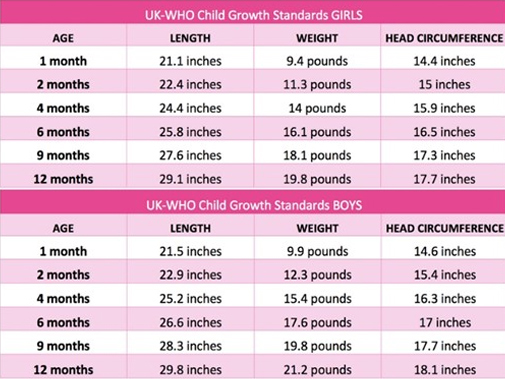Is your baby suddenly clamoring for more food? Is Your supply diminishing? Does your baby grow overnight? Don’t stress out!! All the answer to this question is a baby growth spurt.
A growth spurt is no matter of worry for the mother. It is a good thing as the baby could be fussy and cranky. Growth spurts for babies are an important stage in every child’s developmental stage.
At the end of the article, you will come to find out the sign and symptoms of baby growth spurts and the way how to handle baby growth spurts.
What Is Baby Growth Spurts?

Baby growth spurts are a phase in the developmental stage of a baby where the baby will put on weight, length and head circumference more quickly than usual. It is almost a baby will grow about three times the birth size by the time it’s his or her first birthday.
The growth doesn’t happen suddenly it takes place at certain intervals, almost over a couple of days. This phase is known as a growth spurt. The baby can grow about 1cm in a day as per studies has proved.
Especially during a growth spurt, the breastfed babies nurse more often than usual. And this intake of baby milk is temporary. It is more around the first week of the life of a baby and gets slowed down around 12 months.
[Read: Importance Of Breastfeeding For Mother]
When Do Babies Have Growth Spurts?

The occurrence of a growth spurt for a baby can happen at any time. It doesn’t have a specific time but moreover less it happens around the first week of the life of baby and get slowed down around 12 months.
According to the American Academy of Pediatrics, (R) growth spurts can occur at different ages, such as-
- at two weeks
- at three weeks
- at six weeks
- at three months
- at six months
In the first year of life, “the baby will gain, on average, three times her birth weight and between eight to ten inches in length” as per the American Academy of Pediatrics.
The developmental patterns are different from one another. It is not necessary that all babies will follow this growth spurt pattern. For some baby it will be faster and for some it may be slower. It may vary also in case of premature babies due to a difference in their gestation period.
[Read: Is It Safe To Put Rice Cereal In A Bottle]
Signs And Symptoms Of Baby Growth Spurts:

There are a good chunk of signs of a baby growth spurt that will help you to figure out the symptoms of baby growth spurts, they are as follows-
1. Change In Appetite:
At especially during a growth spurt the breastfed babies nurse more often than usual. Baby is suddenly insatiable, wanting to feed around the clock sometimes around 20 times in a day. The babies will demand extra food in their six months. Studies have prove that for a breastfed baby, the growth spurts can take longer breastfeeding sessions and shorter intervals between feeds each day but whereas a formula fed baby may seem hungry even after feeding.
2. Crankiness:
The major sign and symptoms of baby growth spurts are that the baby will be irritable and need some extra comforting and soothing during this phase of the developmental stage. The baby might be more clingy and need constant close physical contact with her caregivers.
3. Change In Sleep Pattern:
Around the time of newborn growth spurt, the baby will tend to sleep more than usual. There will be usually a bigger change in the sleep pattern of the baby. The babies may sleep up to four and half hours more than usual over one or two days. As per medical News Today (R) sleep stimulates the production of human growth hormone, which facilitates the formation of additional body cells and thereby new tissue layers affects the sleep patterns around the growth spurts.
4. Behaviour Change:
There are a lot more changes with respect to “behaviour” that take place around the growth spurt for baby. Irritability or clinginess may be noticed during a growth spurt.
There is a theory even that tells that the baby may see a developmental leap during the stage of growth spurts which means that the baby may learn a new skill like crawling, rolling over or smiling. This may happen during a growth spurt or can come about at any other time as well. As I mention above it all depends upon one child to another.
Growth Spurt Chart For Babies:

How To Deal With Baby Growth Spurts:

There are certain ways that can add up in helping you to deal with baby growth spurt despite the mother get exhausting and tried. Make sure you follow these-
- It is very important to drink plenty of water especially for the mother as the baby will be draining you of your fluids. To keep your baby well feed, you need to be replenished well by staying dehydrate.
- The breasts produce milk based on a demand-supply equation as many studies have proven. It works as the baby is breastfeeding more, you will be producing more milk. It all depends upon the sucking of your baby. So, it is not recommend to supplement a breastfeeding baby with formula in order to ensure continued supply of milk.
- You can use a sling to carry your baby around as during this developmental stage of the baby they tend to stay more close to you or the caregiver.
- The body of the mother will take a day or two to meet up to the baby’s feeding needs. So in case the mother don’t produce enough milk for over a week or more. Then it is always wise to consult a doctor, to find out the reason.
- The mother should eat and drink at regular intervals as the body may get exhausted due to a frequent feeding pattern.
How Long Do Baby Growth Spurts Last?

The Growth spurts usually last 2-3 days, but sometimes it lasts a week or so. In the case of older babies, they can last up to a week. It is just a temporary phase of development, it last only for a few days.
Growth spurt is an important phase in each and every child. So it is very important to know each and every fact of information about growth spurts. Hope this article has given a good amount of information.










































